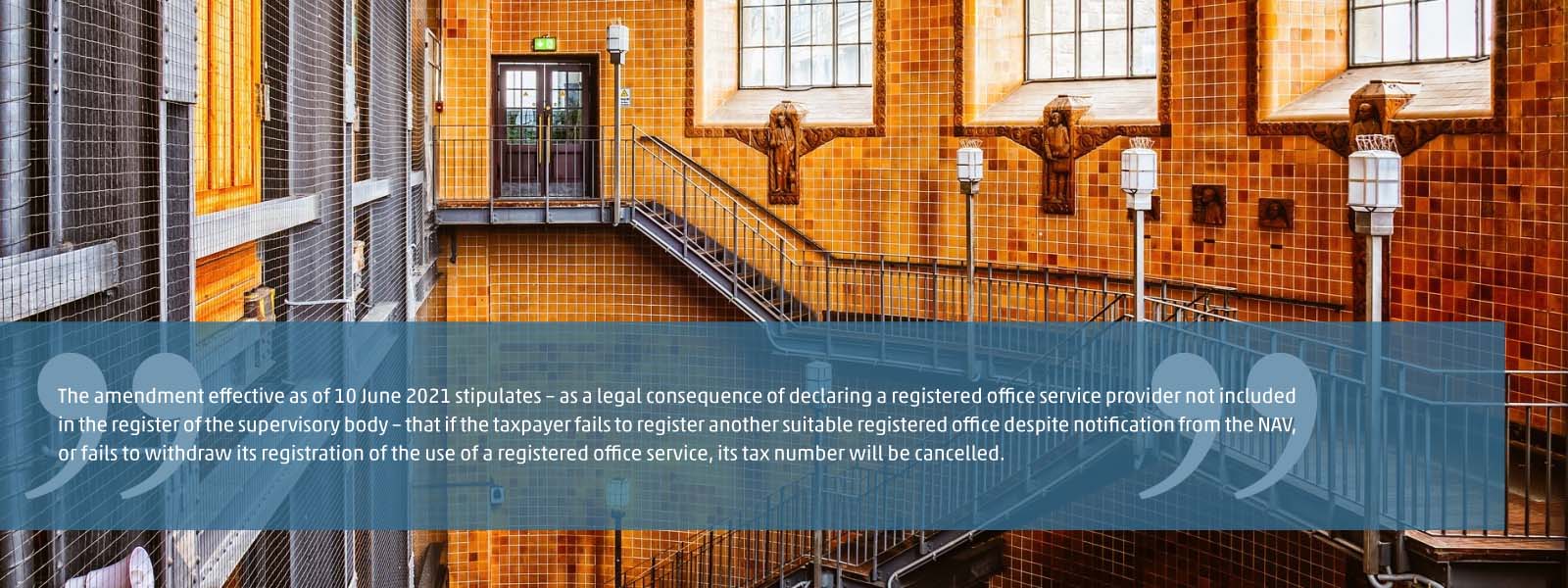Registered office, permanent establishment, branch office, document storage location, place of central administration – terms which nearly all Hungarian businesses have encountered and are familiar with. Or maybe not? These frequently used terms have become part of everyday life for businesses, yet they need clarification and the related reporting obligations, if any, must be highlighted. On a related note, it is also important to mention that as part of the spring tax law amendments, the rules for registered office services were tightened as of 10 June 2021.
Registered office
The definition of registered office, permanent establishment and branch office are set out in Section 7 of Act V of 2006 on Public Company Information, Company Registration and Winding-up Proceedings (Companies Act).
The registered office is the company headquarters entered into the company register. It is the company’s mailing address, the place where its business and official documents are received, filed, safeguarded, archived, and where the obligations set out in specific other legislation for corporate headquarters are satisfied. The company must display a signboard or at least a mailbox to indicate the registered office. For the purpose of company registration procedures, the registered office is also the Hungarian branch office for foreign companies, the direct commercial representation of foreign entities and the permanent establishment for European Economic Interest Groupings.
As a general rule, a company is only entitled to designate a property in the articles of association as its registered office – as well as a permanent establishment or branch office – that it either owns or has the right to use based on an agreement. Such an agreement may be a contract for rent or a contract for registered office services.
Registered office services
In line with the Act on Rules of Taxation in Hungary, the use of registered office services must be reported to the National Tax and Customs Authority (NAV) if the legal relationship for registered office services was established or changed after 1 January 2017.
Self-employed persons must make a written declaration on the use of registered office services when they register at the NAV. Taxpayers registering through the court of registration must also declare the use of a registered office service in writing directly to the NAV within 15 days of the date of registration. Registration and change reporting may be submitted on forms ’T101E and ’T201T. When using such services, entities must report the name, registered office and tax number of their registered office service provider, as well as the start date and, in the case of a fixed-term engagement, the end date of the legal relationship.
Based on Hungarian Act LIII of 2017 on the Prevention and Combating of Money Laundering and Terrorist Financing, only service providers that have reported their activities to the designated supervisory authority may provide registered office services.
The amendment effective as of 10 June 2021 stipulates – as a legal consequence of declaring a registered office service provider not included in the register of the supervisory body – that if the taxpayer fails to register another suitable registered office despite notification from the NAV, or fails to withdraw its registration of the use of a registered office service, its tax number will be cancelled.
Let us look at the details of the above rule. If the taxpayer declares a registered office service provider not listed in the supervisory body’s register, the NAV will call on the taxpayer to declare another suitable registered office or to withdraw the registration of the registered office service used. The amendment allows for this because in a significant number of cases, taxpayers do not declare a contract for registered office services in accordance with the regulations, but rather a simple contract for renting real estate. In this case, there is no reason to require the taxpayer to register another, suitable registered office, it simply needs to withdraw the declaration of the incorrect registered office service (within 15 days). If the taxpayer does not comply with the request, its tax number will be cancelled.
The tax number cannot be cancelled if the taxpayer has restored the legally compliant status before the decision to cancel the tax number becomes final.
Permanent establishment
According to the Hungarian Companies Act, a permanent establishment of a company is a place set out in the company’s articles of association where it carries out its activity and is a permanent and independent establishment located in a different place but in the same municipality as the registered office. If the company has a permanent establishment or a branch office, it must be entered into the business register.
In practice, therefore, any place where a company performs business outside its registered office is considered a permanent establishment.
Branch office
A branch office of a company is a permanent establishment that is located in a different municipality or (in the case of a branch office of a Hungarian company abroad) possibly in a different country than the registered office.
Document storage location
The document storage location is the place where the documents, records, declarations, accounting and tax documents relevant for fulfilling the company’s tax obligations are kept and stored by the business owner. The company must notify the tax authority of this place or places, which can be done using the ’T201T or ’T201 forms. It is important to note that no PO Box can be specified as a document storage location.
If, in accordance with the Hungarian VAT Act, the business keeps documents, books or records that qualify as electronic invoices electronically, ensuring online access, this must also be reported to the tax authority on the ’T201T or ’T201 forms.
The documents may be stored at or transferred to another location only for the duration of accounting and data processing, but in the event of a tax inspection, they must be presented within three working days of the tax authority’s request.
Place of central administration
The place of central administration is the place where the administration, management and decision-making relating to the activities and operation of the business actually take place.
According to the Hungarian Corporate and Dividend Tax Act, the place of management is the place where the management is set up to manage the business.
The company’s articles of association may also stipulate that the registered office is the place of central administration (decision-making) too. Where the registered office is not the same as the place of central administration, the place of central administration must be indicated in the articles of association and the registration of the place of central administration in the company register must be requested. The transfer of the actual place of management abroad must be reported to the tax authority on the ’T201T or ’T201 form.
Nowadays, it is becoming increasingly common for a foreign company to move the place of central administration of its Hungarian subsidiary abroad, where decisions relating to the activities and operation of the company are actually made. However, these decisions have corporate tax implications, so in such cases it is worth consulting a tax adviser to help the company take the necessary steps and minimise the tax risk.
Although in simpler cases businesses do not have a branch office and their places of central administration and document storage are the same as their registered office, in practice – and in most cases – these are often separate. The different addresses of the company must be registered at the Hungarian authorities and must also be considered for taxation. If you have accounting questions related to the registered office, registered office services, various permanent establishments or branch offices, feel free to contact WTS Klient Hungary.











